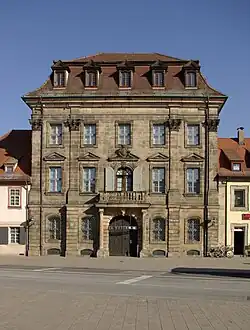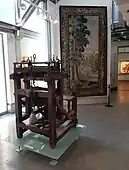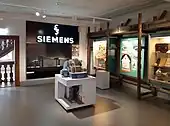 Erlangen City Museum | |
| Established | 1919/1964 |
|---|---|
| Location | Martin-Luther-Platz 9, Erlangen |
| Type | local history museum |
| Director | Brigitte Korn |
| Website | http://www.stadtmuseum-erlangen.de |
Stadtmuseum Erlangen, or Erlangen City Museum, is a municipal museum dedicated to the history of the city of Erlangen, Germany. The museum is housed in the former Old Town 'Rathaus' (town hall), built in 1733/40, and an adjoining town house. Its courtyard serves as a venue for concerts, readings, film screenings, and other open-air events.
History
Erlangen's first local history museum ('Heimatmuseum') was opened in 1919 in the former water tower (previously the university 'Karzer'). In 1964, the city museum was re-established and reopened in the former Old Town Hall under its current name.[1][2]
Exhibitions
The permanent exhibition documents the region's history from pre-historic times to the 20th century, with a focus on Erlangen's Baroque era with the erection of the planned New Town, its Huguenot manufacturies, the Margravial residence, and the founding of today's Friedrich-Alexander-Universität Erlangen-Nürnberg, Bavaria's second-biggest university. Other topics include the Industrial Age and the transformation of the city within the context of German history. The tour ends with Erlangen's development as a "Siemens town" following the end of World War II. The museum houses a significant collection on Huguenot trades (stocking weavers, glove makers, white tanners and carpet weavers).[3]
Changing exhibitions cover a broad variety of topics, such as important events in the city's history, the history of science and medicine, and the visual arts.
Gallery
 A hosier's stocking frame from the 18th century
A hosier's stocking frame from the 18th century "Lego model" of the planned New Town
"Lego model" of the planned New Town Exhibition area about Erlangen's post-war history
Exhibition area about Erlangen's post-war history The museum's courtyard during Poetenfest
The museum's courtyard during Poetenfest
References
External links
Official website 49°36′6.5″N 11°00′13″E / 49.601806°N 11.00361°E